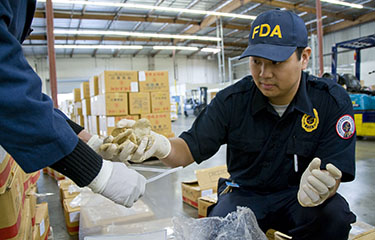The U.S. Food and Drug Administration issued 71 different seafood entry line refusals in July, but for the first time since September 2022, the agency did not deny entry for any shrimp contaminated with antibiotics.
The U.S. FDA refused entry of shrimp from Edhayam Frozen Foods PVT on 25 July for the presence of salmonella and for being filthy. Another shipment of shrimp was also refused on 31 July, according to data on the FDA import refusal dashboard. The shrimp, from Quang Binh in Vietnam, was refused via sample analysis for salmonella.
According to the Southern Shrimp Alliance, the lack of refusals related to antibiotics is an anomaly compared to previous months, as is the fact just one shrimp product was denied entry. In the previous three months, the organization said, the FDA refused 55 entry lines of shrimp for filth and/or salmonella.
Since the beginning of the year, the FDA has refused 28 entry lines of shrimp for banned antibiotics. Last month, the agency rejected 10 shipments of shrimp related to antibiotics.
The alliance added that while the FDA’s reporting on its entry line refusals “seems to indicate” it is inspecting fewer shrimp imports, it also appears to show it has improved its ability to detect seafood violating rules about antibiotics, once they have been detected. An example is the Division of the West Coast, which the SSA said refused three lines of croaker due to the presence of veterinary drug residues.
Another division, the Division of Northeast imports, also refused 11 entry lines of croaker for the same reason.
The SSA added that the FDA appears to be taking action against short-weighted seafood after three entry lines of squid were refused for “added bulk.”
All told in July, eight different products were issued import refusals due to salmonella, including tilapia from Copacol Cooperativa Agroindustrial Consolata, based in Brazil; Octopus from Maspesca, based in Mexico; bass from Li Ying Seafood, based in Taiwan; and barramundi from Gallant Ocean International, also based in Taiwan.
Over half of the import refusals, meanwhile, were related to being identified as “filthy.” From the start of July until 31 July, 37 different seafood items were refused for filth, and over half of those refusals were from two companies. Hai Son Foods, based in Vietnam, had 10 items of tuna refused for filth on 31 July from the Division of West Coast Imports. Thailand-based Sea King Foods Co., the other main offender, had 10 items of crab refused on 20 July.
The SSA has been pushing for greater enforcement of requirements on foreign imported shrimp as plummeting prices are causing some U.S. shrimp harvesters to sit out the season. The alliance is urging the U.S. government to pass the Laws Ensuring Safe Shrimp (LESS) Act forward, a measure that would see 70 percent of import duties collected deposited in a fund that would help the U.S. FDA fund inspections to “eliminate banned antibiotics from shrimp supply chains.
“Pushed to the margins by cheap imports tainted with harmful chemicals, shrimpers are struggling to sell their catch and are confronting one of the worst years this industry has ever experienced,” SSA Executive Director John Williams said in a release. “The LESS Act is proof that Congress has a vital role in the continued viability of our shrimp industry.”
Photo courtesy of the U.S. Food and Drug Administration







